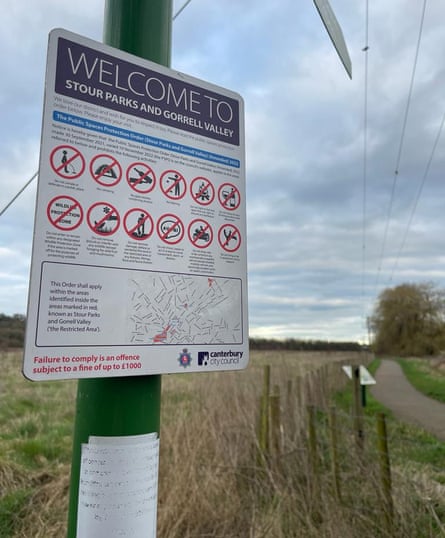Shouting, leaving your spectacles in the sun and stroking a pony are among the rural activities outlawed by councils under the banner of managing antisocial behaviour this summer, according to campaigners.
The Manifesto Club, a leading civil liberties group, said swathes of new public spaces protection orders (PSPOs) have been introduced or extended by local authorities, criminalising activities and behaviours under the banner of managing antisocial behaviour or environmental harm.
It means the English countryside is being transformed into a patchwork of prohibitions, they say, with traditional countryside pursuits being clamped down on.
Elmbridge borough council has outlawed dawn and dusk angling with a ban from 7pm to 7am. In north-east Lincolnshire, all metal detecting requires a prior permit.
“PSPOs were meant to target activities harming local quality of life but they’re increasingly used as a blanket prohibition to criminalise activities and behaviour that no reasonable person would consider antisocial,” said Josie Appleton, director of the Manifesto Club.
“Some local authorities have banned shouting in the middle of absolutely nowhere,” she added. “While shouting might be annoying, how else are you meant to respond if someone’s in danger?”
In the last year alone, councils have introduced PSPOs that ban shouting in the middle of the countryside, urination in designated sea areas across Bournemouth, Christchurch and Poole, and the possession of any object that could pose a fire risk in the Peak District. Open water swimming has been criminalised in Salford and parts of Somerset. Pitching tents or sleeping on beaches has been outlawed by multiple councils.
Jon Moses, of the Right to Roam campaign, said: “We need a rules-based access system, like Scotland’s, with a comprehensive code that reflects how people use the countryside, sets clear limits on irresponsible behaviour and helps build consensus on real issues.”
Some of the most contentious PSPOs ban camping stoves, which many say are vital for outdoor safety, and remove exemptions for supervised use by educational and youth groups.
“Carrying a stove on the hills is a safety requirement,” said one local walker who works with youth groups. “These bans make it unlawful for young people to prepare food or stay warm in poor weather – putting them at risk.”
Appleton said the bans risk criminalising young people and school groups for taking part in responsible outdoor learning. “If young people aren’t taught to use stoves safely, they’ll either misuse them or avoid the outdoors altogether,” she said.
The orders apply to open access land, moorland, footpaths and informal picnic areas. They are often not signposted, leaving people unsure of the rules. Despite their sweeping effect, campaigners say councils often provide little evidence that the banned activities are persistent or cannot be managed with more proportionate tools. In the case of the Peak District, the orders were passed with minimal public consultation and no published rural or equality impact assessments.
While walking her dog in rural Kent, Tessa saw a notice threatening her with a £1,000 fine if she engaged in 12 activities, including shouting, swearing, drinking alcohol or using a catapult.

“I was in the middle of nowhere and suddenly there was this sign screaming at me about all the things I couldn’t do,” she said. “It’s ‘ban everything’, bureaucratic overreach; an outrageous policing of everyday behaviour.”
Swimming in natural water has come under widespread attack. North Lincolnshire’s blanket ban criminalises any swimming outside a club context. In Abbots Pool, Somerset, wading and even quiet, individual swimming has become a criminal act punishable by fines of £75.
Imogen Radford, the Right to Swim lead at the Outdoor Swimming Society, said councils increasingly misuse the legislation. “The PSPO legislation states that there has to be an actual problem affecting local people before it can be enacted,” she said. “The idea that wild swimming is antisocial blows my mind.”
Wild camping bans have also proliferated – often, say campaigners, with no attempt to distinguish between destructive, long-term encampments and responsible, overnight stays. In Dorset, Worthing, Sefton and parts of the Lake District, PSPOs now criminalise anyone pitching a tent or sleeping on a beach.
Critics say the new wave of PSPOs represents a fundamental shift in how public space is governed. Appleton said: “This isn’t about protecting sensitive sites – it’s about controlling harmless behaviour.”
What’s being lost, they argue, is not just access but the sense the countryside belongs to everyone. “We’re seeing a retreat from trust,” she added. “These orders treat people not as stewards, but as problems to be prosecuted.”
A spokesperson for Canterbury city council said: “All our PSPOs are fully consulted on and we are absolutely certain we have the support of the vast majority of the public.”
A spokesperson for Bournemouth, Christchurch and Poole council said: “The orders can be modified in specific areas, for versatile enforcement.”
An Elmbridge council spokesperson said greater numbers of fishers had “resulted in reports of littering and human waste being deposited on the land”.
A Dorset council spokesperson said: “Dorset council introduced the PSPOs following public consultation.”
A spokesperson for North East Lincolnshire council said: “The numbers of applications received show that people continue to enjoy metal detecting responsibly within the designated areas.”
Cumberland council said: “Cumberland council has zero tolerance for environmental harm, and anyone breaching the PSPO risks a fine or prosecution.”

 3 months ago
74
3 months ago
74

















































